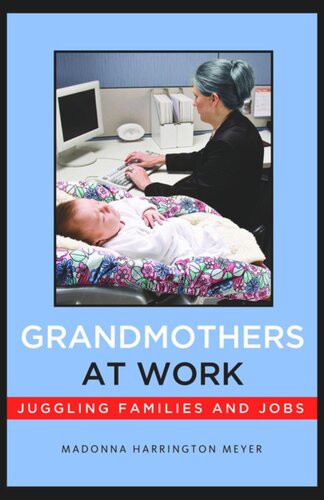

Most ebook files are in PDF format, so you can easily read them using various software such as Foxit Reader or directly on the Google Chrome browser.
Some ebook files are released by publishers in other formats such as .awz, .mobi, .epub, .fb2, etc. You may need to install specific software to read these formats on mobile/PC, such as Calibre.
Please read the tutorial at this link: https://ebookbell.com/faq
We offer FREE conversion to the popular formats you request; however, this may take some time. Therefore, right after payment, please email us, and we will try to provide the service as quickly as possible.
For some exceptional file formats or broken links (if any), please refrain from opening any disputes. Instead, email us first, and we will try to assist within a maximum of 6 hours.
EbookBell Team

4.4
102 reviewsWinner of the 2014 Richard Kalish Innovative Publication Award presented by the Gerontological Society of America
Young working mothers are not the only ones who are struggling to balance family life and careers. Many middle-aged American women face this dilemma as they provide routine childcare for their grandchildren while pursuing careers and trying to make ends meet. Employment among middle-aged women is at an all-time high. In the same way that women who reduce employment hours when raising their young children experience reductions in salary, savings, and public and private pensions, the mothers of those same women, as grandmothers, are rearranging hours to take care of their grandchildren, experiencing additional loss of salary and reduced old age pension accumulation. Madonna Harrington Meyer’s Grandmothers at Work, based primarily on 48 in-depth interviews conducted in 2009-2012 with grandmothers who juggle working and minding their grandchildren, explores the strategies of, and impacts on, working grandmothers.
While all of the grandmothers in Harrington Meyer’s book are pleased to spend time with their grandchildren, many are readjusting work schedules, using vacation and sick leave time, gutting retirement accounts, and postponing retirement to care for grandchildren. Some simply want to do this; others do it in part because they have more security and flexibility on the job than their daughters do at their relatively new jobs. Many are sequential grandmothers, caring for one grandchild after the other as they are born, in very intensive forms of grandmothering. Some also report that they are putting off retirement out of economic necessity, in part due to the amount of financial help they are providing their grandchildren. Finally, some are also caring for their frail older parents or ailing spouses just as intensively. Most expect to continue feeling the pinch of paid and unpaid work for many years before their retirement. Grandmothers at Work provides a unique perspective on a phenomenon faced by millions of women in America today.